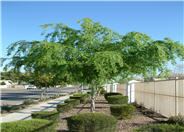
Common name:Chinese Elm, Chinese Evergreen Elm
Botanical name:Ulmus parvifolia
Chinese Elm quickly reaches 50' tall and 60' wide with an upright habit and spreading pendulous branches with age. Chinese Elm has small, dark green leaves. Foliage turns yellow or orange in fall. Small, greenish yellow flower appear in summer but are considered insignificant. Small light brown fruit appear in fall but are not noticeable. Bark is brown gray but with maturity, exfoliates to reveal orange patterns.

Common name:Coast Redwood, Redwood
Botanical name:Sequoia sempervirens
This fast-growing, aromatic tree has soft, dark green foliage with long needles appearing in flat sprays and brown, barrel-shaped cones that appear after 1 year. Its soft, red-brown bark is fiberous and furrowed. Particularly after mechanical damage, this tree will stump sprout to form new, young trees around the stump. Avoid planting in areas of high foot traffic.

Common name:Red Clusterberry Cotoneaster
Botanical name:Cotoneaster lacteus
This is an evergreen shrub that grows to a size of 8' tall with long, arching branches. Cotoneaster exhibits dark green leaves above and gray beneath with dusky red fruit. It requires sun to part shade with little or no watering. This plant is tough enough to naturalize in many areas in CA, and should be considered potentially invasive.
We can identify at least 11 steps of sustainable landscape renovation for consideration. They include critical design, installation and maintenance practices that conform to good principles of appropriate horticulture.
Click in the green box for more information
Designer: Jeff Gamboni Landscape Archite
Photographer: GardenSoft
Physical weed control, including mulching, or hand removal protects the watershed from harmful chemicals.
Remove irrigation water and fertilizer from areas where you don't want weeds to grow.